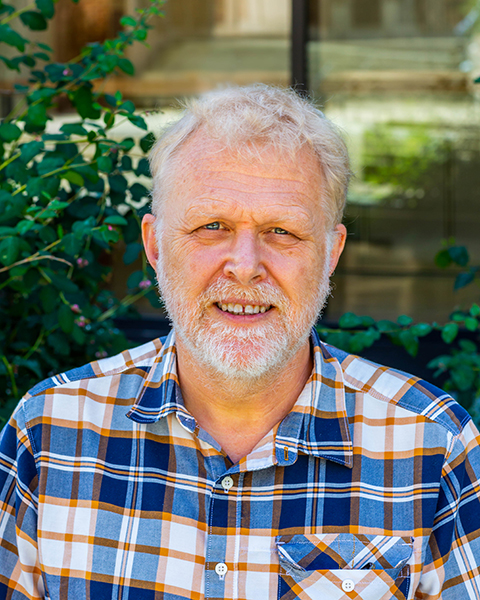Allen School professor Richard Anderson earned the ACM Eugene L. Lawler Award for Humanitarian Contributions within Computer Science and Informatics from the Association for Computing Machinery for his work bridging computer science, education and global health. Anderson, who co-directs the Information and Communication Technology for Development (ICTD) Lab, has devoted himself over the past two decades to advancing computing innovations that improve quality of life for people in rural and low-income communities around the globe.
After beginning his research and teaching career focused on theoretical computer science, Anderson embraced the opportunity to generate a tangible impact on underserved populations by helping to build up the emerging field of ICTD beginning in the early 2000s. One of his earliest contributions was to community-led education via the Digital StudyHall project, which brought high-quality teaching and interactive content to rural classrooms in India via facilitated video instruction. He subsequently teamed up with Seattle-based global health organization PATH on Projecting Health, an initiative aimed at using digital communications to help people in low-resource areas, including those with low literacy, to learn about and practice health-oriented behaviors to support maternal and child health. To date, Projecting Health has reached an estimated 190,000 people across 180 villages through local-produced videos addressing topics such as nutrition, immunization, and family planning.
“Through empowering community teams with this novel simplified filming and editing process to develop messaging for their own communities, Richard and our team achieved what rarely is achieved in global health — full ownership of a process by the very communities who would then use the output,” said Dr. Kiersten Israel-Ballard, the team lead for Maternal, Newborn, Child Health and Nutrition at PATH and an affiliate professor in the UW Department of Global Health. “As a global health specialist, it is rare to work with a visionary like Richard, who bridges fields and cultures to create innovative solutions. Our work is better having learned from him and his team.”
For the past six years, Anderson has led the development and deployment of open-source software tools for mobile data collection and analysis known as the Open Data Kit (ODK). Initially the brainchild of Anderson’s late friend and colleague Gaetano Borriello, ODK started out as a customizable survey tool designed to be “easy to try, easy to use, easy to modify and easy to scale.” Governments and non-profit organizations in more than 130 countries have relied on successive versions of ODK — including a second-generation version of the toolkit developed under Anderson’s leadership that enabled non-linear workflows and longitudinal surveys — to advance public health, wildlife conservation, election monitoring, essential infrastructure, and more.
Shortly after taking the helm, Anderson and his collaborators managed the successful transition of ODK from a UW initiative to a stand-alone enterprise. Anderson and his team subsequently extended the original software’s capabilities with the release of ODK-X, which enables users such as PATH, the World Mosquito Program and the International Federation of Red Cross and Red Crescent Societies to build customized Javascript-based apps for managing and visualizing data in the field in addition to the traditional survey forms. Recent applications of ODK-X include vaccine cold-chain management, vector-borne disease monitoring, and humanitarian response.
Anderson has also led the charge to bring secure digital financial services to areas that lack access to traditional banking. In 2016, Anderson and other members of the ICTD Lab joined forces with the Allen School’s Security and Privacy Research Lab to launch the Digital Financial Services Research Group (DFSRG) with the goal of making financial products such as mobile payments and savings accounts more accessible to underserved communities. With funding from the Bill & Melinda Gates Foundation, the DFSRG addresses fundamental challenges to the development and large-scale adoption of digital financial products to benefit some of the lowest-income people in the world to enable them to participate in digital commerce and ensure that, in Anderson’s own words, “an event like an accident or a pregnancy doesn’t send them over the edge.”
As one of the founding champions of the ICTD movement, Anderson has been instrumental in uniting various communities under the umbrella of ACM COMPASS — short for Computing and Sustainable Societies — and organizing conferences, workshops, and tutorials to engage more researchers, practitioners and students in this work. He has also been a vocal proponent of diversifying host countries to include conference sites such as Ecuador, Ghana and Pakistan. In conjunction with his research and community leadership, Anderson has been credited with demonstrating how to build effective collaborations between computer scientists and non-governmental organizations (NGOs). By combining the former’s technical expertise with the latter’s geographical and domain expertise, Anderson has forged partnerships that ensure solutions developed in the lab can be effectively deployed in the field by people without computing experience — and that they actually address the real-world problems of the people they aim to serve.
“Richard is a top-notch computer scientist and a more than capable teacher, but his real contribution is creating an environment in which CS innovation can be brought to bear on the real problems of real people in developing regions,” said Eric Brewer, a professor of computer science at the University of California, Berkeley who is also Fellow and VP Infrastructure at Google. “His work is inspiring to students across many disciplines, especially when they see the impact of his work on others.”
Anderson joined the Allen School faculty in 1986 after completing a postdoc at the Mathematical Sciences Research Institution in Berkeley, California. He earned his Ph.D. in computer science from Stanford University and his bachelor’s in mathematics from Reed College. Anderson is the first Allen School faculty member to receive the ACM Eugene L. Lawler Award, which is typically given once every two years in honor of an individual or group who has made a significant humanitarian contribution through the application of computing technology.
Read the ACM citation here, and learn more about the Eugene L. Lawler Award here.
Congratulations, Richard!


